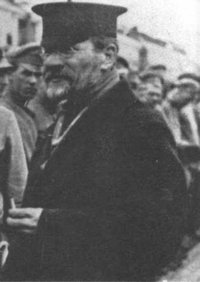Mikhail Kalinin
|
|
Mikhail Ivanovich Kalinin (Russian: Михаи́л Ив́анович Кали́нин) (November 19 (November 7, O.S.), 1875–June 3, 1946) was a Bolshevik revolutionary and Soviet politician.
Born to a peasant family in Verkhnyaya Troitsa village (Верхняя Троица), Tverskaya Gubernia, Russia, he moved to St. Petersburg in 1889 and became a metal worker. In 1898 he joined the Russian Social Democratic Labour Party (РСДРП). From March 1919 to 1938 he was Chairman of the All-Union Executive Committee i.e., titular head of state, informally known as "the all-Union Chieftain" (всесоюзный староста). The title was then changed to President of the Presidium of the Supreme Soviet, which he assumed. He would remain head of state until 1946. Kalinin was a candidate member of the Politburo from 1919 until 1925 when he became a full member. He remained on the body until 1946.
During the Great Purge, many wrote letters to Kalinin with petitions to reconsider the fates of the convicts, and indeed, Kalinin's intervention often helped, thus giving him the reputation of "kind grandfather Kalinin" (recall that Stalin was "dear father" to all Soviet people then). However, at the same time, Kalinin routinely signed execution lists together with other members of the Politburo, such as the authorization of the Katyn massacre.
He retired in 1946 and died shortly afterward in Moscow. Kalinin was buried in the Kremlin Wall necropolis. The city of Tver bore the name Kalinin from 1931 to 1990 in his honor. The former German city of Königsberg (East Prussia), conquered in 1945 by the Red Army and incorporated into the Soviet Union, was renamed Kaliningrad in his honor.
de:Michail Iwanowitsch Kalininfi:Mihail Kalinin fr:Mikhaïl Kalinine ja:ミハイル・カリーニン nl:Michail Kalinin pl:Michaił Kalinin sl:Mihail Ivanovič Kalinin ru:Калинин, Михаил Иванович

